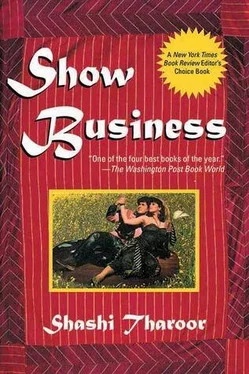Is it true? Can it really be?
Could it be a mistake, can you really see?
That your lo-ove shines on my face …
I’m just a little girl from the heart of India,
I know nothing of worldly sin, dear,
I’m just a village girl with stars in her eyes,
And you’ve taken me by — surprise.
Is it true? Can it really be?
Is this life or a Bombay moo-ovie?
That puts my hand in yours …
Is it true? Can it really be?
Are you, my hero, really free?
To give me a joy that endures …
This doesn’t happen in my part of India,
My heart beats so much you can hear the din, dear,
I’m just a village girl who’s never told lies,
And you’ve just made me your — prize.
Is it true? Can it really be? …
It was true, of course. And the song was played everywhere, on transistors and record players, over Muzak systems and public-address loudspeakers, by radio disc jockeys responding to importunate requests from Jhumri Tilaiya, by two hundred-rupee per evening hired bands at every imaginable public festivity. And every time I heard it I kept seeing that scene from the film where she looked up at you holding her, and I saw an adoration in her eyes that no amount of nervous direction from Mohanlal could ever have placed there. And I knew you had won her.
The next couple of movies made a star out of her and a prophet out of me. Maya and her makeup men managed to combine her fresh-faced innocence with just enough expert artifice to make her a convincing heroine, without losing the quality that made audiences like her in the first place. She didn’t have the figure of Abha or Vyjay-antimala, she couldn’t dance like Hema Malini or Saira Banu, but she captivated every cinemagoer in the country. They loved her, Ashok. She was every man’s sister or daughter, every woman’s ideal. And she could act: she was a true professional.
And then during the shooting of that third film, Radha Sabnis broke the news in Showbiz:
Darlings, brace yourself for a shocker from Bollywood! Your Cheetah has learned that Ashok Banjara, the common man’s superstar, the actor whose success gave hope to every garage mechanic in the country, is about to wed! And who is the brave and noble woman prepared to make Saddy Longlegs the happiest ham in Vers ova? That’s the shock, little jungle creatures: it’s none other than the nation’s sweetheart, Maya Kumari! Is it true? Can it really be? I’m afraid it is, darlings. When the bombshell bursts, don’t say Cheetah didn’t warn you! Grrrowl …
I grrowled a few times myself, in between tears of impotent rage. I drank myself silly for a week. And then I went back to Sunita, not for the last time, and pushed her against the wall. I closed my eyes and imagined it was Maya. It didn’t work, and I wept my drunkenness and shame into the sink, not knowing who I hated more, myself or you.
What you did was a crime, Ashok Banjara. You deprived India of its most cherished celluloid daughter, you deprived the Hindi film industry of its finest actress, and you deprived me. You deprived me not of hope, because by then I had none for myself, but of that last vestige of pride left to a man who has not been rejected for someone else. Once she agreed to marry you, having refused to marry me, I could no longer take solace in telling myself she had given me up for her career. Instead, she gave up her career for you.
You made her do it, of course. All those interviews about “I wouldn’t want my wife to feel she needs to work” — disingenuous bastard. And then you got her to tell the press, “I’m giving up films of my own free will because I want to be the ideal wife and daughter-in-law.” Did anyone believe those words weren’t scripted for her, and rather badly at that? “Ideal wife and daughter-in-law”: does anyone ever talk like that, outside the movies? Come on, Ashok, you could have done better. Couldn’t you for once have had the courage of your characterless convictions and simply announced, “No wife of mine is going to be pawed and chased and hugged in public, not even by me. Maya is being instructed to retire from films to preserve my exaggerated sense of self-esteem.” But no, you weren’t capable of that kind of honesty, were you. I know what you’re going to say: how can I blame you — every single Indian actress has “retired” after marriage, from Babita to Mumtaz, from Jaya to Dimple, who only came back to films when her marriage was over. Why these intelligent and resourceful women should all behave as if the acting profession were incompatible with married respectability, I don’t know. But they’ve set the pattern, and that lets the slimy hypocrites like you off the hook.
Even if you’d stopped at that I’d have found it impossible to forgive you. But you then spent the next five years making it much worse.

Interior: Day
I can’t believe I’m doing this.
Me, Ashok Banjara, leading superstar of the Indian cinema, commander of fees in the range of several lakhs (can’t be too precise, you know how these income tax chaps are), not to mention son of the general secretary of New Delhi’s ruling party, wooing an aging gossip columnist over pink champagne, lip-synching the obligatory inanities that an invisible tape in my head plays back to me from a dozen remembered screenplays. But it is me, it’s my mouth that’s saying these improbable things, it’s my hand that is placed, with exaggerated lightness, on her gnarled and painted claw. Radha Sabnis, the dreaded Cheetah of Showbiz magazine, sits in her lounge, flattered by my attentions, while I pour on the butter that wouldn’t normally melt in my mouth. I have come to make peace.
Cheetah sits in an imitation leopard-skin pantsuit on an imitation velvet sofa, guzzling the champagne, for which she is embarrassingly grateful, and eyeing me from under artificial lashes with what some lyricist might call a wild surmise. She is of medium height, thin, really thin, like a Bangladesh refugee in costume, and she has a pale death-mask face that seems to have been meticulously disarranged by a malicious undertaker: a hooked nose like the beak of an injured parrot; exaggeratedly shaped eyebrows arched in an expression of perpetual interrogation; a profusion of deep lines that deepen asymmetrically every time she speaks a word; pinched, sallow cheeks; and the whole effect framed by lusterless shoulder-length hair practically dripping with henna. This discredit to the species wields the most powerful pen in Bollywood, and my visit to her is the idea of my new PR agent, Cyrus Sponerwalla.
Cyrus is bespectacled and overweight, but he knows his stuff, and he’s got good ideas like the one that contracted his Parsi profession-derived surname from Sodawaterbottleopenerwallah to its current incarnation. Imagine converting a liability like that into an exclusive, distinctive, slightly exotic sounding name that fits on visiting cards, is easy to pronounce, and is a surefire conversation starter. “Icebreaker,” Cyrus corrects me. “The ice is what you need the soda-water-bottle-opener-wallah for, party-wise.” But Cyrus Sponerwalla is not here to hold my hand, nor the Cheetah’s, for that matter. In making love or war, surrogates just aren’t good enough.
“This is most generous of you,” says Radha Sabnis, the questioning curve of her ridiculous eyebrows suggesting that she doesn’t think it’s anything of the sort. “Pol Roger Rosé, 1968. A wonderful champagne.”
Читать дальше













